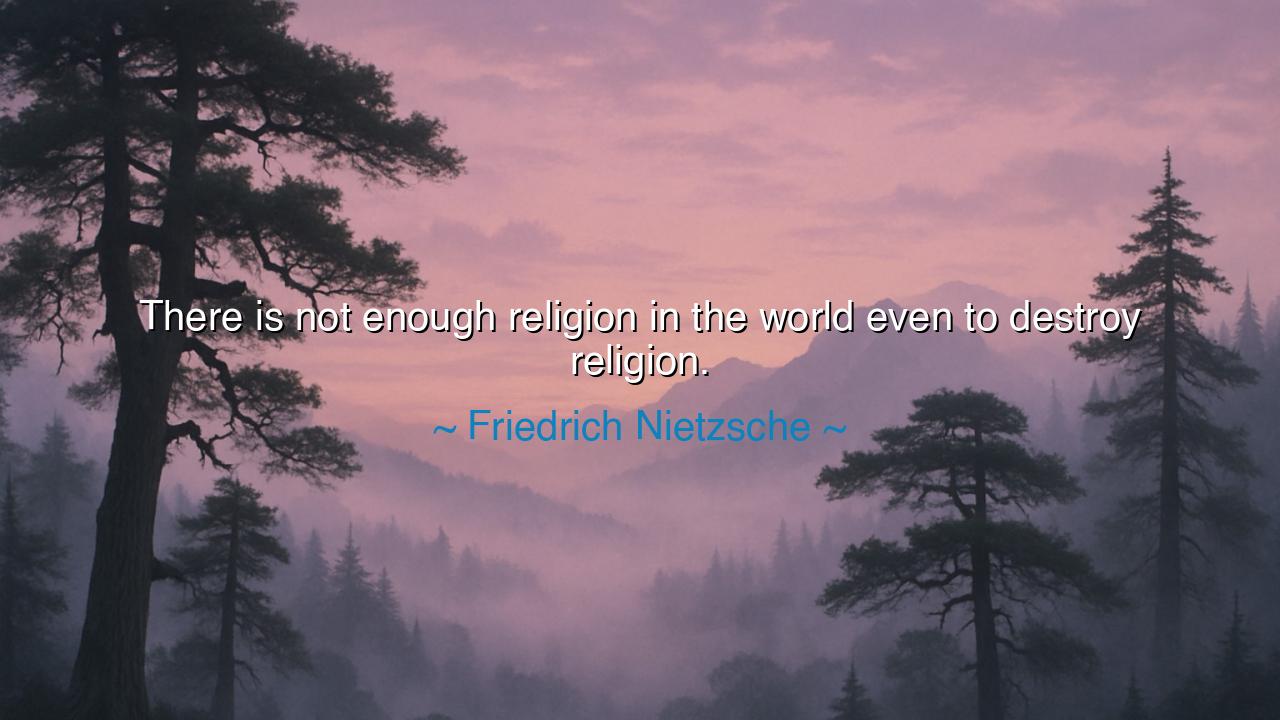
There is not enough religion in the world even to destroy






"There is not enough religion in the world even to destroy religion." These powerful words from Friedrich Nietzsche speak to the paradox at the heart of human civilization: religion, in its various forms, has shaped the course of history, driven wars, and sparked the deepest moral debates, yet it remains an entity so deeply ingrained in the human soul that even its own destruction seems impossible. Nietzsche, a philosopher of profound insight, challenges us to examine not only the power of religion but the inevitability of its presence in human life. For, he suggests, there is no force, no movement, no amount of rebellion that can rid the world of religion, for it is woven into the very fabric of human existence.
In the ancient world, religion was not just a set of beliefs or a system of worship—it was the foundation of identity, culture, and the laws that governed people’s lives. Homer’s epics, the Iliad and the Odyssey, were filled with gods whose influence reached into every aspect of human existence. Zeus ruled over the heavens, Poseidon over the seas, and Hades over the underworld. The gods were not distant figures—they were active participants in human affairs, shaping victories, defeats, and fates. People’s lives were lived in direct relation to the divine, and even the greatest heroes, like Achilles or Hector, found themselves at the mercy of the gods. In that time, religion was woven into the very bones of existence, inseparable from the human experience. Even the mighty heroes, with all their might, could not escape the influence of divine will.
Consider the rise and fall of the Roman Empire, where religion was seen as a tool of statecraft. The emperors, though wielding enormous power, often had to align themselves with the gods to maintain the trust of the people. The Roman pantheon was vast, and no emperor dared rule without some form of divine sanction. Even in the face of great philosophical movements such as Stoicism and the rise of Christianity, religion held sway. Constantine, the first Christian Roman emperor, recognized the profound influence of religion on the lives of his people. His conversion, and the subsequent rise of Christianity as the state religion, forever changed the landscape of the empire. The power of religion proved to be more than a tool—it was an indomitable force that transcended mere politics or human law.
But Nietzsche, ever the iconoclast, understood the limits of this power. He saw religion not as an external force but as something that arose from the human condition itself—a deep yearning for meaning, for understanding, and for control over the uncertainties of life. Religion, in this sense, becomes self-perpetuating, ever-evolving, and ever-present, even in the face of efforts to destroy it. Voltaire famously declared, “If God did not exist, it would be necessary to invent him.” In much the same way, Nietzsche asserts that religion cannot be wiped away—it is a part of what makes us human. Even in an age of reason and enlightenment, as we seek to strip away old beliefs and embrace new philosophies, we find that religion endures, perhaps in forms we do not recognize, but still present in our collective soul.
The Enlightenment, which sought to break the chains of superstition and blind faith, demonstrated Nietzsche’s point in a different way. The movement aimed to replace religious dogma with reason, but even in its victory, reason was not able to rid the world of the hunger for meaning that religion had once filled. Immanuel Kant, though a philosopher of reason, still acknowledged the importance of faith in moral life. As Nietzsche would later argue, we cannot escape the need for meaning, and religion, in whatever form, continues to offer that meaning. Even today, we see how societies, though increasingly secular, still search for spiritual and philosophical systems to fill the void left by traditional religion. Whether in the form of new age movements, spiritual practices, or even in the quest for material success, we continue to seek something beyond the mundane, something transcendent.
The lesson that Nietzsche offers is not one of despair but of understanding. Religion, in its many forms, is not merely a construct of ancient peoples or a relic of primitive thought—it is woven into the human experience, a reflection of our deepest needs for meaning, order, and purpose. No matter how much we strive to rationalize or rebel against it, we cannot escape the truth that religion, or the need for it, is part of the fabric of our being. Rather than attempting to destroy it, we must learn to understand it, to see how it shapes our lives, and to examine the ways it can both uplift and bind us.
In practical terms, this means we must engage with our beliefs, question them, and reflect on their place in our lives. Nietzsche’s challenge is not to abandon religion but to recognize it as an ongoing part of the human journey—something that, like all aspects of life, needs to be examined and evolved as we continue to grow. Let us take this understanding with us, knowing that the pursuit of meaning and truth is a journey that will always be intertwined with the spiritual hunger of humanity.






AAdministratorAdministrator
Welcome, honored guests. Please leave a comment, we will respond soon